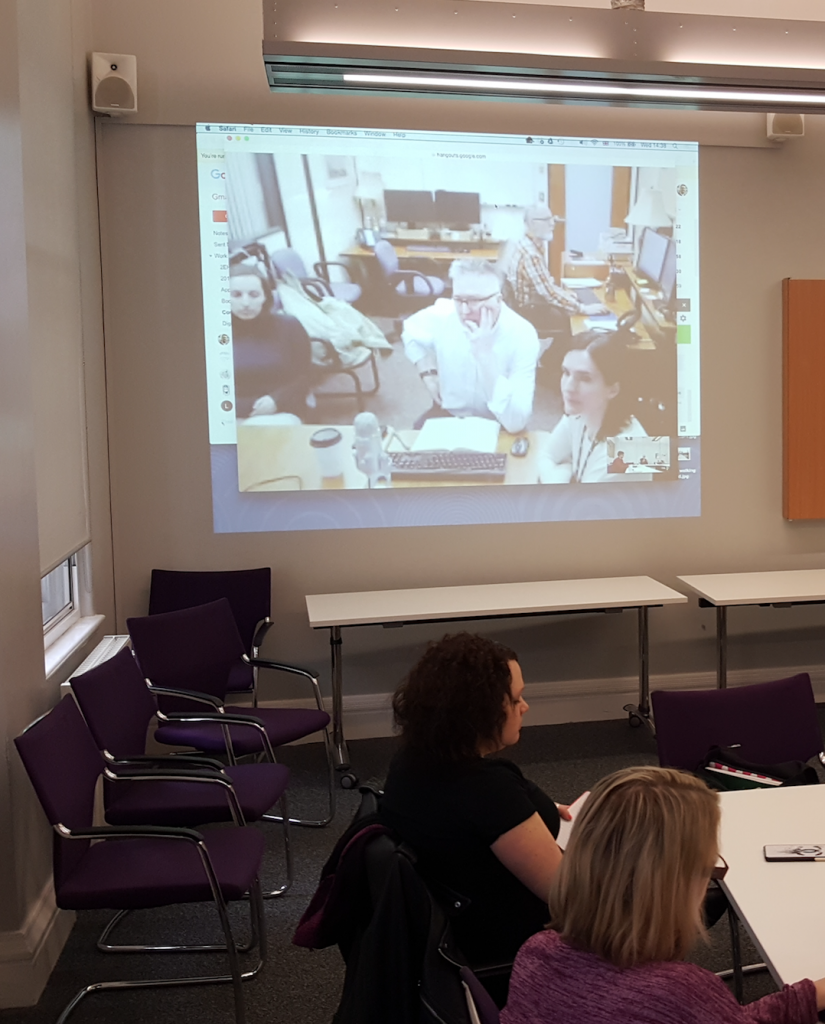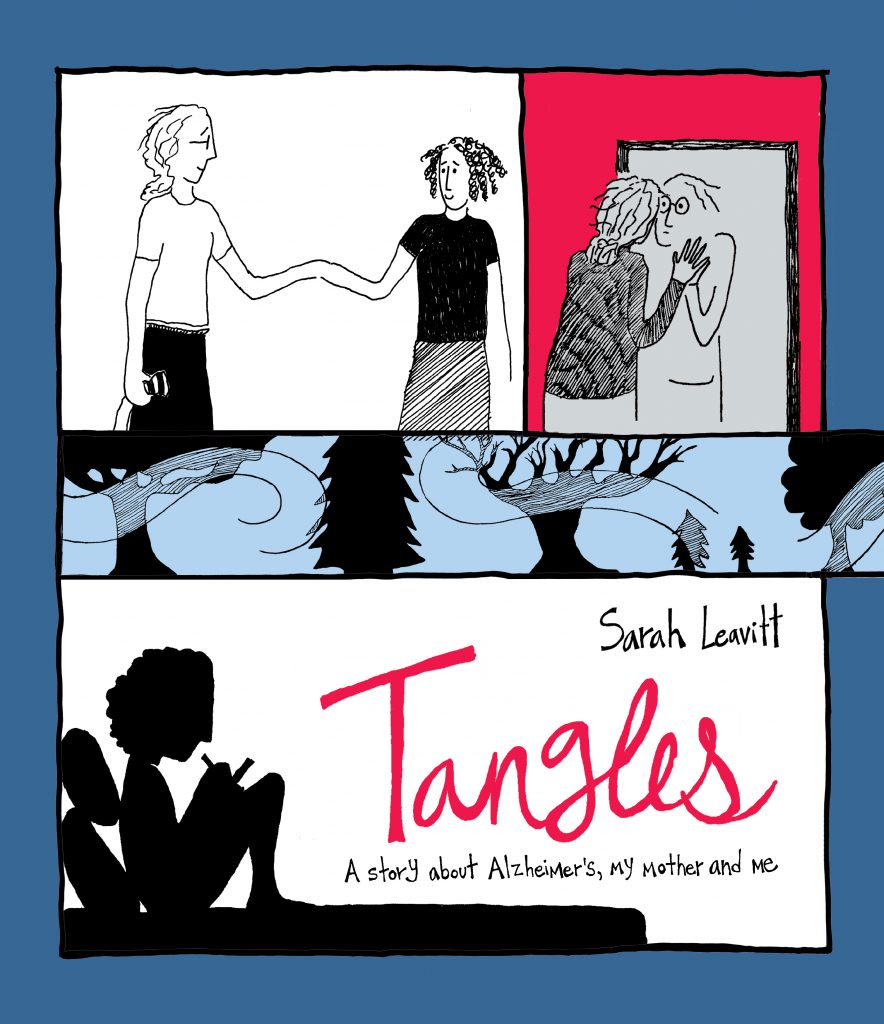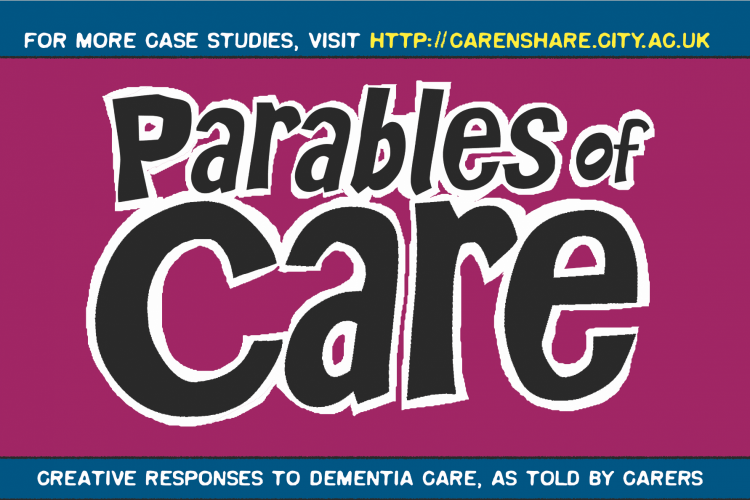
Dr Peter Wilkins is the Research and Innovation Coordinator at Douglas College (Canada), and he manages programs for at-risk youth for the Douglas College Training Group. Peter is a founding editor (with David N. Wright) of Graphixia and the Deputy Editor of The Comics Grid: Journal of Comics Scholarship.
Peter worked in partnership with Dr Simon Grennan of the University of Chester, Dr Ernesto Priego of City, University of London, and an NHS Trust, to produce Parables of Care.
We asked Peter some questions about working on Parables of Care.
What is it that most interested you about Care’N’Share as a resource?
Peter Wilkins: Care‘N’Share gives a startling insight into the caregivers’ relationship to the dementia situation and their patients. I think we were all struck by the power of the stories even though they often occur in the most mundane settings. If we looked at it from a literary or narrative point of view, the stories often begin in realist mode and then suddenly shift into a surrealist or absurdist one.
The caregiver is like a character who passes through the wardrobe into a Narnia painted by Salvador Dali. Or like Marlowe going into the Congo in Heart of Darkness. They bring back something that gives us a glimpse into an alternative reality that shocks and frightens us. The uncanniness of the stories made me think of an untapped potential in using art, not as therapy, but as a means of accounting for dementia in a way that medical discourse doesn’t allow us to do.
Some stories in Parables of Care appear to be more or less difficult to ‘get’. What was the thinking behind it?
PW: Well, dementia is difficult to ‘get.’ Indeed, it is what philosophers would call sublime, unpresentable. This is where the idea of parable as a form or genre comes from and why we were so interested in the stories in the app. They are stories of practical reason, of enigmatic utility, of not knowing what to do in a difficult situation. This quality of the stories lends to the caregivers a kind of poetic heroism: they are faced with demands from the other side of rationality, dementia world, that they have to respond to in creative ways. So our conclusion was that caregivers are poets. To present the comics as easy solutions to the difficult problems of caring for people with dementia would not do justice to the caregivers.
On a related note, we were not interested in using the comics medium as a way of making things appear simple, in an “instrumental” use of comics. We don’t care for the idea of comics as simplistic communication; we care for the idea of comics as provocative works of art that will make their audience think and think again. It was great to work with Simon because he understands this through and through, and his drawings work really well at managing the audience’s response.

You are based in Vancouver, Canada. Can you tell us more about Douglas College‘s involvement in Parables of Care?
PW: We want to produce a companion volume to Parables that depicts the attitudes towards, and knowledge about, dementia from faculty and students across our Health Sciences faculty. We are working with focus groups from a range of programs, from Nursing through Dental Assisting, to generate material for the comic. The enthusiasm for the project here is tremendous, so we are very excited.
We are involving students in the work, which is important to us. They are running the focus groups and collecting the data. We have a young artist who has more experience in video game design than comics, but she is very committed and enthusiastic. It will be interesting to see how her work plays off of Simon [Grennan]’s. Sarah Leavitt, whose Tangles: A Story of Alzheimer’s, My Mother and Me is a groundbreaking graphic memoir on the subject, is consulting on the project, working with the artist.

A number of people from the faculty have told me about how they are professional caregivers, but when one of their family members has been struck by dementia they have been incapable of dealing with it. I’m interested in capturing those stories.
In any event, I see Parables of Care as the beginning of a much larger project that explores and documents dementia in comic book form.
Did you identify differences in how Canada and the UK approach dementia care?
PW: I can’t answer this question yet, but I hope to have some clues as we compare the data we collect with that from the Care‘N’Share app. I suspect that there will be differences and that they will be meaningful because even within Canada the different caregiving disciplines that engage with dementia don’t seem to communicate with each other that much. There are all kinds of gaps in the responses. I hope that the project allows people who work with dementia sufferers and their families to connect some dots and work towards a more holistic and universal approach to care.
There’s more than a hundred cases in Care’N’Share. As an editor, how did you approach the collection?
Our approach was to identify cases that represented particular strands of the dementia situation. While each case is unique, the stories do fall into categories: broken analogies, misrecognition, confinement and a desire for freedom and so on. What is important is that there are lots of satisfying though enigmatic eureka moments, where the undoubtable horror of dementia is relieved temporarily by the caregiver’s sympathy and genius.
–
Parables of Care can be downloaded as a PDF file, under a Creative Commons Attribution-NonCommercial 4.0 International License, from City Research Online: http://openaccess.city.ac.uk/18245/.
If you live in the UK you can request printed copies at no cost here.


